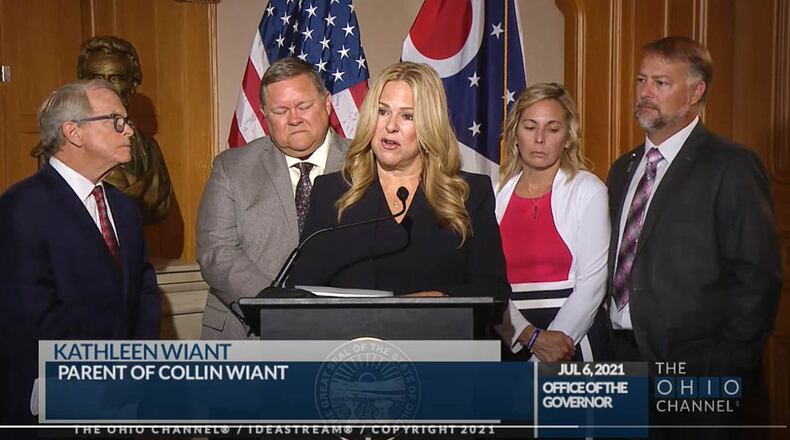Senate Bill 126, also known as Collin’s Law, is named for Collin Wiant, an Ohio University freshman from Dublin who died in 2018 after inhaling nitrous oxide during a ritual hazing. Earlier this year, Stone Foltz died from alcohol poisoning following a pledge event at Bowling Green State University fraternity.
DeWine said both families turned their grief “into something very, very positive with the goal that no other families will suffer the horrible, horrible tragedy that they have suffered.”
Collin always stood up for the underdog and the new Ohio legislation is a tribute to her son’s values, said Kathleen Wiant, who spoke at the bill signing ceremony with husband Wade at her side.
“Collin was a protector by nature,” she said. “I can think of no greater way to honor him than a law in his name designed for the sole purpose of protecting others.”
In addition to expanding the definition of hazing, the law which takes effect in 90 days, also increases the penalty from a fourth-degree misdemeanor to a second-degree misdemeanor. It also expands the number of officials required to report hazing. A violation that results in serious can result in a third-degree felony conviction, DeWine said.
It’s been just four months since Shari and Cory Foltz of Delaware lost their son, Stone, who was in the process of joining Pi Kappa Alpha fraternity. He was found in his apartment unconscious after allegedly forced to drink heavily at a March 4 pledge event. Eight men were indicted in April on charges related to Foltze’s death, according to the Wood County Prosecutor’s Office. The fraternity has been permanently banned from BGSU, according to university officials.
“We made a promise to Stone on his hospital bed that we would keep fighting. We would not allow this to happen again to anyone,” Shari Foltz said Tuesday. “No parent should have to go through this — any family.”
One of the anti-hazing law’s primary sponsors, state Sen. Stephanie Kunze, R-Hilliard, said passage of the law is to celebrated, only in a non-joyous way: “But we also recognize and mourn the incredible loss that has brought us to this point.”
In addition to a statewide hazing prevention plan, the law also requires each institution to have its own anti-hazing policy, educate campus communities about hazing awareness and prevention, as well as maintain and post hazing violations online.
Universities already have hazing policies in place, including Wright State’s, which was updated in 2018, said Gina Keucher, program director, Student Involvement & Leadership for Fraternity & Sorority Life.
Wright State’s update expanded the definition of who was a member of the “university community” to include alumni, volunteers, students, coaches and others. The onus for reporting suspected hazing was also put on any university official or employee, Keucher said.
Three Wright State University organizations have been sanctioned under the current hazing policy. Two sororities are currently suspended, and one fraternity has completed educational sanctions stemming from a self-reported hazing allegation, according to Keucher.
Despite the anti-hazing policies in place, the new law will require the university to make some adjustments, Keucher said.
“The law is very clear that there are specific requirements to educate not only students, but faculty and staff, as well as volunteers that have contact with students, and that students must receive that training prior to joining any student organization,” she said. “As we receive more information and guidance from the Chancellor (of the Ohio Department of Higher Education) we will begin to create a plan to educate and track compliance with that portion of the law.
Hugh Sherman, president of Ohio University said the institution currently has a “stringent” anti-hazing policy that not only governs fraternities and sororities, but also athletic teams and all student organizations.
Sherman said OU has implemented a scorecard and if hazing is alleged — even if minor — the group is put on suspension and the reported incident investigated. If hazing is proven, the group is suspended immediately for four years. Currently, three OU groups are under suspension and investigation, he said.
Rodney K. Rodgers, Bowling Green State University president, said beginning this fall all fraternities and sororities will be required go through a recommitment plan that includes additional education and training.
“We thought we were doing a very good job at this historically,” he said. “But we need to step it up even more in terms of education.”
The University of Dayton plans to convene a working group to study the new legislation and make any necessary adjustments, and educate students, student organizations and appropriate faculty and staff, according to officials at the university where two organizations are currently suspended for hazing-related violations.
The bill also requires nearly every employee, alumnus or volunteer associated with public or private primary, secondary, or post-secondary schools — as well as parents — to report hazing. Failure to report suspected hazing could result in misdemeanor charges.
Bringing those “additional eyes” to the issue of hazing will help “make sure hazing is eradicated,” Rodgers said.
The law is a “new beginning” in a quest to rid Ohio schools of hazing, DeWine said.
“I think anyone who sends their child to college should expect that hazing is not part of that experience,” he said.
About the Author

